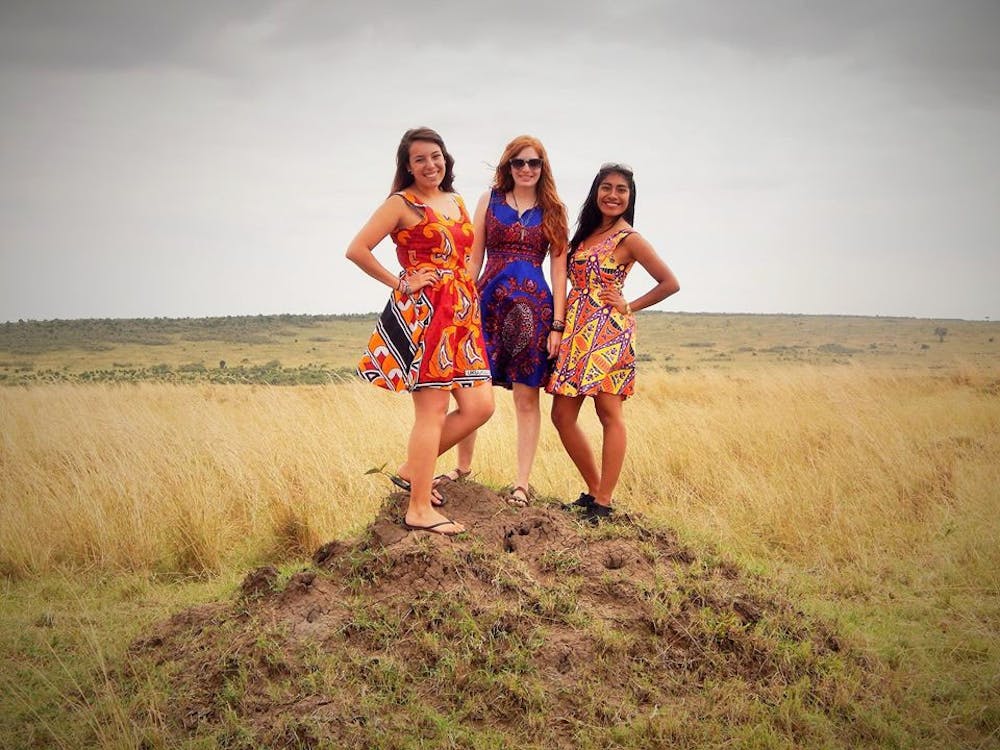Jacob Fuhrer |
On an overcast day in August, seniors Shanana Packus, Eloiza Meza and Jaclyn Sisto found themselves on a small hill dressed in a vibrant printed ensemble that stuck out against the pale landscape. Elephants stood to their left, and lions and cheetahs were only a short distance to their right. However, the students were undaunted by the wild animals because this was, after all, an African safari.
Packus and Meza, both global business majors, and Sisto, a social work major, had summer internships in Kenya aimed around understanding Kenyan culture and working with grassroots organizations to help solve problems facing the local population.
The students worked with groups like the Foundation for Sustainable Development to keep track of Kenya’s local markets, which include livestock like cows, chickens, and rabbits. The group’s aim is to engage locals in sustainable income-generating practices and create avenues of economic growth, such as raising and selling livestock. The organizations also targeted social issues, such as sex education.
Though the students had experience with international travel (Packus has visited over 20 countries) they were anxious about visiting the East African republic.
“I was a wreck,” Packus said. “This could be the best decision of my life or it could be the biggest mistake.”
Packus and Meza were even hesitant to tell their parents about their decision to fly to Africa.
For Meza, the nine-week adventure began with a convoluted series of flights and car rides that delivered her to Shianda, a small village in western Kenya. Upon arrival, staff workers gave her an impromptu lesson in Swahili, a language she had little experience with. Fortunately, many of the locals were also fluent in English. After an orientation session, it was time to work.
Though the students did much of their work in offices, they were surprised by what they learned about Kenyan culture outside of their duties.
Money frequently came up in conversation, and Packus said she jokingly told a local that even in the United States, money does not grow on trees.
“They see us as ATMs,” Meza said.
For Kenyan natives, money doesn’t always refer to paper or coins either.
Packus recalled how a Kenyan man once offered her host mother 60 cows for Packus’ hand in marriage. She also said it wasn’t uncommon to be called “mzungu,” a blunt term denoting whiteness.
“I just wanted to blend in so badly,” Packus said, "but I have the whitest skin tone.”
But aside from the occasional uncomfortable experience, the interns were graciously welcomed by the community. Many families would invite the young women into their homes for tea. However, these offers were usually declined at the advice of trip organizers concerned about safety.
When it was time to fly home, Packus worried about getting back into the country because of the recent Ebola virus outbreak. Without vaccination records, she feared security agents at the JFK International Airport would detain her, or perhaps send her back to Kenya.
Instead, the agent who screened her actually asked her out to dinner.
“I was astonished,” she said.
The Ebola outbreak is not enough to keep Packus away from Kenya. She will be returning in January, and encourages other students to consider making the trip.
“If you want to get to know yourself, go on a trip like this,” Packus said.
Jacob Fuhrer is a reporter for The Beacon. You can reach him at fuhrer17@up.edu and on Twitter @jacobfuhrer.








